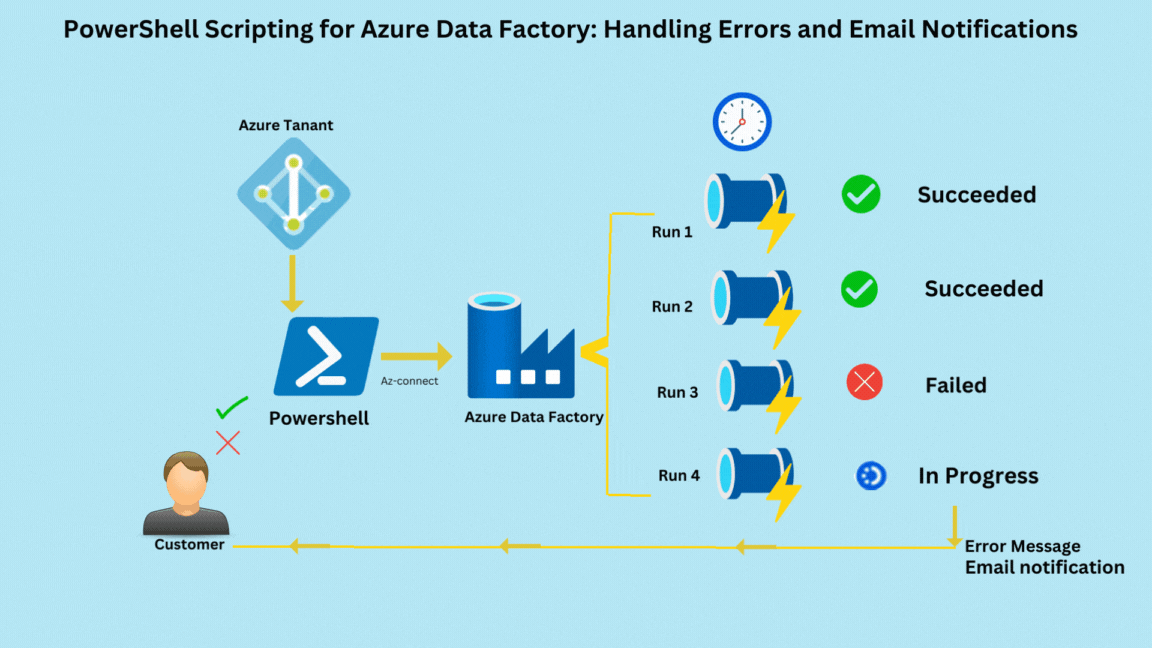
PowerShell Scripting for Azure Data Factory: Handling Errors and Email Notifications
In today’s fast-paced world, quick error identification and response are imperative. This is particularly crucial when working with pipelines that automate complex tasks. Azure offers a monitoring service that can send email notifications when a pipeline fails. However, this service can be costly, particularly if you have numerous pipelines to monitor. We’ve created a cost-effective solution by developing a PowerShell script that sends email notifications upon pipeline activity failures. Moreover, it records error messages in a SQL table for streamlined error tracking and analysis.
PowerShell Connection to Azure Data Factory
One of the main benefits of using PowerShell is its ability to create a seamless link between PowerShell and Azure Data Factory. The “az” module and the “Connect-AzAccount” command make it simple to develop a PowerShell script for creating an Azure Data Factory connection. This connection offers a level of flexibility and dynamism never before possible, allowing you to invoke pipelines from any desired source.
Making Dynamic Pipeline Invocation Possible
PowerShell revolutionizes the concept of dynamic pipeline invocation by giving you unprecedented flexibility and management. With this feature, you can dynamically start pipeline processes independent of their origin or location. PowerShell allows you to run pipelines from a variety of sources, including locally saved pipeline files and external repositories. This adaptability provides you with unrivaled flexibility and simplicity in managing your pipeline activities. Whether your pipelines are saved on your local workstation or in a remote repository, PowerShell offers seamless connection and effortless execution, improving your entire data workflow management experience.
Making Error Handling and Email Notifications More Efficient
To ensure quick responses can be taken when a pipeline activity fails, effective error management and real-time notifications are essential. PowerShell’s adaptability allows you to develop a comprehensive system that not only recognizes and records mistakes but also sends specific error messages to the appropriate individuals. You can proactively notify customers of any unsuccessful activity by utilizing the power of email, giving them the ability to act swiftly and effectively to fix the situation.
Errors Being Stored in a SQL Table
Beyond sending emails to alert users when an error occurs, you can use PowerShell to leverage SQL’s capabilities and save error information in a specific table. This approach makes monitoring, analysis, and reporting simpler by recording and storing errors in a systematic way. This method offers a dependable and centralized store for mistake data, improving problem-solving and decision-making.
Benefits of Monitoring and Alerting Using PowerShell
There are various benefits to using PowerShell for Azure Data Factory monitoring and alerting:
- ADF pipelines are more easily controlled thanks to dynamic invocation.
- Using the “az” module, you can establish a seamless connection to ADF.
- Effective mistake handling and email messages sent in real-time.
- Centralization of error information storage in a SQL table for thorough analysis.
- Streamlined procedures for making decisions and troubleshooting.
In conclusion, PowerShell greatly improves Azure Data Factory monitoring and alerting. It provides a flexible and dependable framework for monitoring pipelines, documenting errors, and sending warnings, ensuring efficient data operations and prompt resolution of any potential issues. Because it sends emails logically, it also saves money. Its pay-as-you-go model allows for the addition of bespoke logic. Companies may streamline their data management procedures and boost the effectiveness of their Azure Data Factory operations by utilizing PowerShell’s features.



